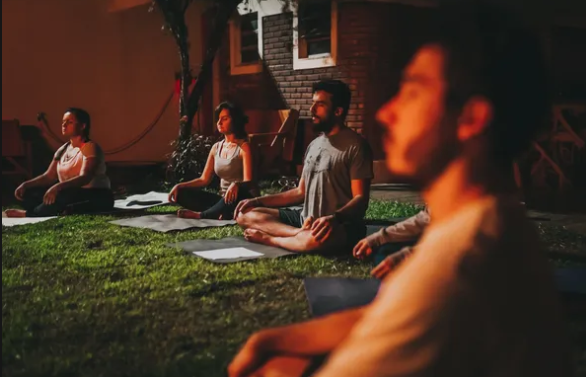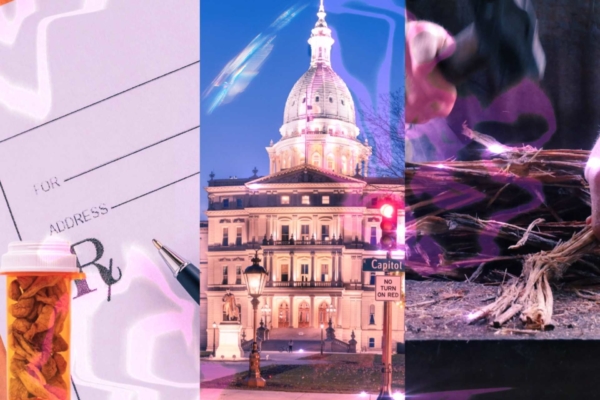
Shasta Winn, the founder of Saba Cooperative and Program Director of Myco Method, has responded strongly to the recent media coverage and the HECC’s second cease and desist order. The order has threatened to shut down Saba Cooperative unless they comply with state regulations.
For those unfamiliar with Saba Cooperative, it is an itinerant, interfaith 501(c)3 non-profit DAO (Decentralized Autonomous Organization). Their mission, as stated on their website, is to make various natural building, growing, health, spiritual, and living practices accessible to the public through donation-based offerings.
Saba Cooperative currently offers the Myco Method curriculum, an approved psychedelic facilitator curriculum by the Oregon Health Association.
On May 20th, 2022, the Oregon Health Association (OHA) implemented rules outlining the curriculum requirements for psychedelic facilitator training programs in accordance with Measure 109. As a condition for licensure, facilitators are required to complete an OHA-approved training program curriculum.
The Higher Education Coordinating Commission (HECC) is in charge of all colleges and universities in Oregon. They make financial decisions and decide how much public funding learning institutions receive and offer different programs for students. HECC’s main job is to make sure colleges provide high-quality education, that they have academic policies in place and that they are financially sound.
According to state laws, Saba Cooperative is considered a private school and falls under the jurisdiction of the HECC. Therefore, in order to offer Myco Method’s curriculum, Saba Cooperative must obtain approval from both the OHA and HECC.
Why Did Myco Method Receive a Cease and Desist Order?

In an email, HECC’s Director states: “Given the information we have received from you to date, we are unable to move forward with Saba Cooperative and the Myco-Method in the school licensure process. Still outstanding are proof of adequate capital reserves to cover operations for the first year and a plan for how expenses will be covered in the second year. Once we have reviewed that information to determine that your school is financially viable, we will require that you pay the nonrefundable application fee so you can proceed with processing your new school application.”
Myco-Method is required to halt its marketing and student enrollment until it obtains a license or exemption from licensure, as mandated by HECC. However, Myco Method continues to offer the curriculum to all.
The email thread shared with Psychedelic Spotlight sheds light on a bureaucratic system that places the burden of compliance on religious communities, something Winn believes should not be required because of a religious exemption.
In a response email to the HECC, Winn makes it clear: “During the initial interview, I clearly stated that we are not a private career school. We are a religious organization that aims to demonstrate, by any means necessary, that we meet all the regulatory standards of HECC-licensed schools.”
However, HECC’s Director’s response indicates that Winn’s plea for religious exemption is not deemed satisfactory: “In your email communication to HECC dated May 23rd, 2023, and reiterated here, you assert that your school is a religious organization and not a private career school. However, the material you have shared thus far has not provided sufficient evidence for such an exemption. Regulations require appropriate evidence to process a religious exemption.”
Read also: Oregon Non Profit Launched Inaugural Training for Psilocybin Facilitators
So What Now?
If you’re wondering about the Religious Freedom Restoration Act on a Federal level, I am afraid that doesn’t help much in this particular situation, and Oregon doesn’t have a state-level RFRA. On a federal level, the RFRA protects a person’s freedom to believe in whatever religious doctrines one desires; the freedom to act cannot be. “Conduct remains subject to regulation for the protection of society. The freedom to act must have appropriate definition to preserve the enforcement of that protection.”
Upon closer examination of a specific document from the Department of Justice to the OHA, dated May 25th, 2022, titled “Licensure and Regulatory Requirements for Religious/Entheogenic Psilocybin Practitioners,” it is evident that the excerpt suggests the absence of a religious exemption possibility.
”Does the Religious Freedom Restoration Act (RFRA) or a state equivalent, or any other constitutional provision or law compel OHA to treat applications from religious or entheogenic organizations differently from other applications? Short Answer: No.”
This leaves Winn and Myco Method at the mercy of the DEA religious exemption process, with no clear timeline for resolution.
The process of obtaining religious exemptions, specifically the DEA exemption process, raises concerns about its constitutionality. Petitioners must disclose any illegal activities without assurance or protection from criminal charges. Moreover, they are likely instructed to cease practicing their religious beliefs or sacrament rituals while awaiting a response.
We asked Winn how she feels about this entire situation and her thoughts on the likelihood that the DEA will grant an exemption. She states:
“As the founder of an interfaith religious nonprofit that uses psilocybin to access divine connection, it’s definitely concerning the level of cronyism currently involved with psilocybin training and services in Oregon.
HECC is currently demanding application fees of $5.5k-$7.5k to give out “psilocybin career school” licenses, which are federally illegal for them to issue. That may be acceptable to those corporations that have chosen to engage in the illegal licensing operations with them, but it’s not acceptable to our religious organization. We are unwilling to be complicit in such things and will not accept coercion. The HECC’s acts are criminal and according to our bylaws, we cannot contract with any criminal organizations.”
Winn is sticking to her ethical argument that the Saba Cooperative does not fall under HECC’s jurisdictional authority or domain because of religious exemption.
Winn continues:
“Regardless, we have promised them we will provide everything necessary to prove we meet all the professional standards, while not getting illegally licensed. They have made that impossible, however, by not giving any clear indication of what they need to see regarding reserve capital, yet insisting we must show it’s “adequate.”
As for the DEA, it seems they are able to see this is a serious burden to our missions and practices and are trying to help us. I’ve also reported to the US Department of Education, and next will be the IRS.
The DEA is currently making arrangements to inspect our proposed cultivation location in Tennessee. We anticipate and hope the DEA exemption will be expedited to bring us relief from the HECC and any other government organizations that would choose to violate our right to freedom of association through such coercive tactics.
Upon DEA exemption, our mobile, itinerant organization should have protections for our facilitators to teach and engage in our practices, wherever, whenever, as aligned with our missions. Per the RFRA, this should prevent us from having to deal with any issues like this again. Or at least that’s what I hope. “
It is worth noting that the DEA has never granted a religious exemption with great ease! In 2006 and 2008, court orders granted exemptions to two churches, the Santo Daime and the Uniao de Vegetal, based on a Supreme Court case and its application in the 9th Circuit. Another religious group, Soul Quest, filed a lawsuit against the DEA after waiting for over three years to receive a response. In 2021, the DEA’s Diversion Control Division issued a final determination, deeming Soul Quest lacking religious sincerity according to federal law enforcement. The routine lack of response from the DEA leaves most religious practitioners without a clear path to legal protection. The requirement for churches to disclose all drug-related activities and suspend them until the DEA responds exposes them to a higher risk of criminal enforcement. Considering the legal risks associated with these petitions, they seem to outweigh any potential benefits for these communities. As a result, many counsel religious groups against applying for the DEA exemption.
This continuing saga involving Saba Cooperative and the Myco Method, the ongoing conflict between religious freedoms and bureaucratic regulations, has come to the forefront once again! While the HECC maintains a steadfast position on licensure and financial viability, Shasta Winn and her organization remain unwavering in their belief of religious exemption. The DEA’s historical reluctance to grant religious exemptions further complicates the matter, leaving numerous religious entities in a precarious position.
The story of Saba Cooperative serves as a poignant reminder of the challenges faced by religious organizations and nonprofit organizations in navigating the intricate web of psychedelic legalities, highlighting the inevitable reality that there might be a massive backlog piling up in the DEA’s office and perhaps calls for a fresh look at what it means for the government to substantially burden religious practice, and how the DEA evaluates religious sincerity.





